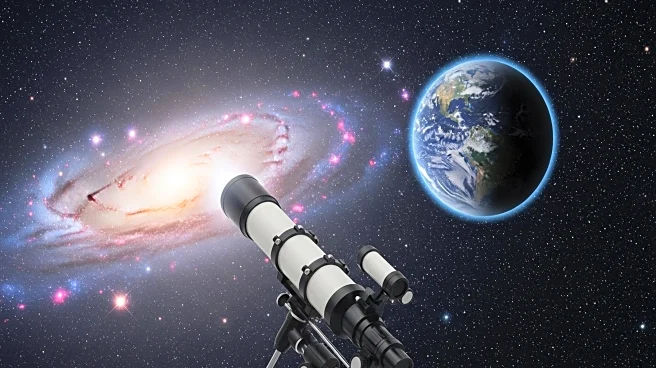What's Happening?
Astronomers Christopher Watson and Annelies Mortier are leading efforts to find a planet similar to Earth that could potentially support life. This quest began in 1995 when Swiss astronomers Michel Mayor and Didier Queloz discovered the first exoplanet orbiting a star similar to the Sun. Since then, over 6,000 exoplanets have been cataloged, revealing a diverse array of planetary systems. Despite this, a true Earth twin has yet to be found. The search involves using advanced spectrographs like the Harps-N, which can detect minute changes in starlight caused by orbiting planets. This ongoing exploration aims to understand how common Earth-like planets are in the universe.
Why It's Important?
Finding an Earth-like planet has significant implications for understanding the potential for life beyond our solar system. Such a discovery would not only advance scientific knowledge but also inspire philosophical and existential discussions about humanity's place in the universe. The search for exoplanets drives technological innovation in astronomy and related fields, leading to improved observational techniques and instruments. Additionally, discovering a habitable planet could influence future space exploration missions and international space policy, as nations may collaborate to study these distant worlds.
What's Next?
Astronomers will continue to refine their techniques for detecting exoplanets, focusing on improving the sensitivity and accuracy of their instruments. Future missions may involve deploying more advanced space telescopes capable of directly imaging exoplanets and analyzing their atmospheres for signs of life. International collaborations will likely play a crucial role in these efforts, pooling resources and expertise to enhance the search for Earth-like planets. As technology advances, the possibility of finding a true Earth twin becomes increasingly feasible.
Beyond the Headlines
The search for Earth-like planets raises ethical questions about the potential colonization of other worlds and the impact of human activity on extraterrestrial environments. It also challenges cultural and religious narratives about humanity's uniqueness and the nature of life. As scientists continue to explore the universe, these discoveries may inspire new philosophical and artistic expressions, reflecting humanity's evolving understanding of its place in the cosmos.











